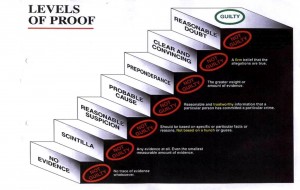

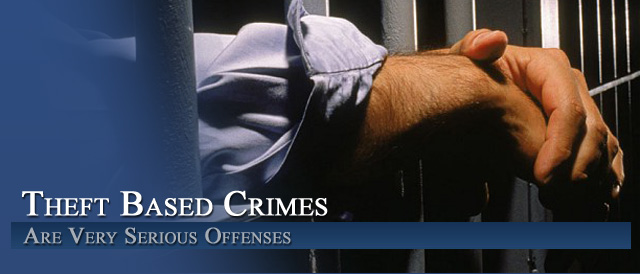
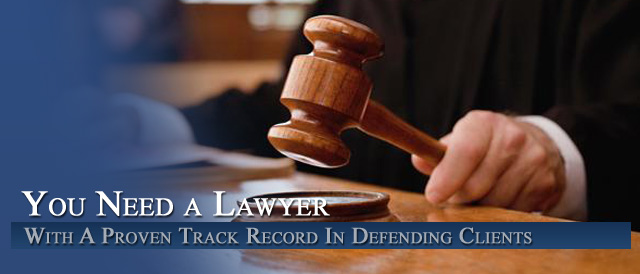
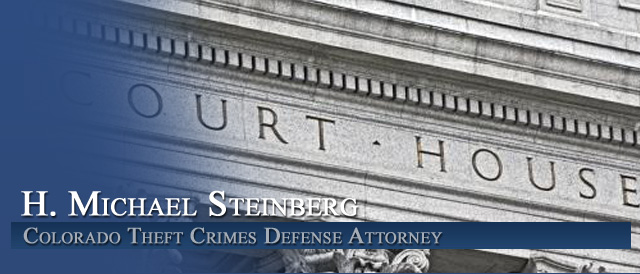
Colorado Criminal Theft Law – A Civil Suit For Theft 18-4-405- Treble Damages – The Other Shoe Drops
By H. Michael Steinberg – Colorado Criminal Theft Crimes Defense Lawyer
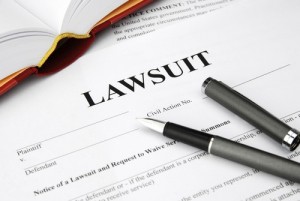
Colorado Criminal Theft Law – A Civil Suit For Theft 18-4-405 – Treble Damages – The Other Shoe Drops
Colorado Criminal Theft Law – A Civil Suit For Theft 18-4-405 – Treble Damages – The Other Shoe Drops – A Colorado Theft Crime website would be remiss if the site did not address a victim’s right – under Colorado civil law – to file a civil lawsuit for money damages. Unfortunately for those involved in Colorado theft, robbery and or burglary cases, provides a simple and effective tool to reach the assets of the convicted AND the non-convicted Defendant in a civil law suit…it is called the Rights in Stolen Property Statute.
The law is straightforward. Colorado’s “Rights in Stolen Property” statute provides that the owner of property taken by theft, robbery or burglary has the right to sue the taker (usually the criminally accused) for THREE TIMES the value of the loss and that person can also sue for the ATTORNEY’S FEES and OTHER COSTS made necessary to collect and these money damages.
The Plaintiff in this civil lawsuit can also track stolen property to the new owner or purchaser of the property even if the new owner had no idea the property was stolen and that person purchased the property in good faith. In this context, however, recovery is limited to the property itself. It can be taken from the good faith purchaser and there is no right, in this context, to recover, additional damages and attorney’s fees and costs beyond the recovery of the property stolen.
The Colorado Civil Theft Statute CRS § 18-4-405
As of 2016 – the so called “Rights in Stolen Property Statute” – CRS § 18-4-405 (“The Civil Theft Statute”) provides, in part,
…..that property obtained by theft, robbery, or burglary shall be restored to the owner. The owner has the right to sue the person who stole the property, as well as anyone in whose possession it is found. Under the Civil Theft Statute, the owner may be permitted to recover treble damages, costs, and attorney fees.
Here is the entire statute:
18-4-405. Rights in stolen property
All property obtained by theft, robbery, or burglary shall be restored to the owner, and no sale, whether in good faith on the part of the purchaser or not, shall divest the owner of his right to such property. The owner may maintain an action not only against the taker thereof but also against any person in whose possession he finds the property.
In any such action, the owner may recover two hundred dollars or three times the amount of the actual damages sustained by him, whichever is greater, and may also recover costs of the action and reasonable attorney fees; but monetary damages and attorney fees shall not be recoverable from a good-faith purchaser or good-faith holder of the property
The requisite burden of proof for awarding treble damages under this section is the preponderance of evidence standard rather than the higher burden used in criminal matters of beyond a reasonable doubt
Some Critically Important Bullet Points As To The Operation Of The Colorado Civil Theft Statute CRS § 18-4-405
“Actual damages” include noneconomic damages as well as economic damages. Non-economic damages refers to compensation for subjective, non-monetary losses such as pain, suffering, inconvenience, emotional distress, loss of society and companionship, loss of consortium, and loss of enjoyment of life
A suit is allowed – also known as a “private right of enforcement” in cases where the government fails or refuses to prosecute a crime.
A defendant can be liable under the statute, EVEN IF they are never convicted of the crime in the criminal case. Th law requires ONLY proof of a criminal act, but not a criminal conviction. The words “convict, conviction or convicted” are not found in the statute thus the that the taker need not be first convicted of a crime.
The burden of proof on the Plaintiff in this civil case is the much lower burden of proof by a preponderance of the evidence.
Two important mental states must be established along with the other elements of the offense.
While all of the statute’s elements must be proven these elements include two critically important culpable mental states:
(1) the defendant knowingly obtained control over the owner’s property without authorization;
and
(2) the defendant did so with the specific intent to permanently deprive the owner of the benefit of the property
The Civil Courts use the elements of the tort of “conversion” to recover damages under 18-4-405 “Conversion” uses the basic elements of criminal theft and reads as follows:
The elements of the tort of conversion are:
1. that the Defendant
2. knowingly
a. exercised control over
b. anything of value
c. which was the property of another,
3. without authorization,
4. with the intent to permanently deprive that person of the use or benefit of the thing of value.
To be absolutely clear, a Plaintiff need not prove a criminal conviction for theft, burglary, or robbery to prevail on a claim under Colorado’s Civil Theft Statute.
Summary and Conclusion – Colorado Criminal Theft Law – A Civil Suit For Theft 18-4-405 – Treble Damages – The Other Shoe Drops
Colorado’s stolen property statute allows the rightful owner of stolen property to recover that property from the possession of another person. § 18-4-405 in a civil lawsuit which is sometimes called a suit for “conversion.”
For this law to apply, “the owner of the property must prove that the taker … committed acts constituting at least one of the statutory crimes” listed within the statute.
While the law does not define theft, the law is found in the Colorado Criminal Code, and the terms used in the stature are therefore defined within the scheme of the statutory framework of that criminal code.
Theft is defined “knowingly obtain[ing] or exercis[ing] control over anything of value of another without authorization, or by threat or deception, and . . . [ i]ntend[ing] to deprive the other person permanently of the use or benefit of the thing of value.”§ 18-4-401 (1) (a), C.R.S.
Colorado civil courts require a Plaintiff to meet the statutory definition of criminal theft to recover for civil theft. Put differently, a Plaintiff must prove the commission of a criminal act, but need not prove a prior conviction as a condition for the recovery of treble damages.
To recover treble damages, attorney’s fees and costs in a Civil Lawsuit for Conversion – a Plaintiff must establish:
(1) that the defendant knowingly obtained control over the owner’s property without authorization and
(2) that he or she did so with the specific intent to permanently deprive the owner of the benefit of property.”
Colorado Criminal Theft Law – A Civil Suit For Theft 18-4-405 – Treble Damages – The Other Shoe Drops
If you found any of the information I have provided on this web page article helpful please click my Plus+1 or the Share buttons for Twitter and Facebook below so that others may also find it.
If, after reading this article, you have questions about your case and would like to consider retaining our law firm, we invite you to contact us at the Steinberg Colorado Criminal Defense Law Firm – 303-627-7777.
Never stop fighting – never stop believing in yourself and your right to due process of law. You will not be alone in court, H. Michael at your side every step of the way – advocating for justice and the best possible result in your case.
 ABOUT THE AUTHOR: H. Michael Steinberg – Email The Author at [email protected] – A Denver Colorado Criminal Defense Lawyer – or call his office at 303-627-7777 during business hours – or call his cell if you cannot wait and need his immediate assistance – 720-220-2277. Attorney H. Michael Steinberg is passionate about criminal defense. His extensive knowledge and experience of Colorado Criminal Law gives him the edge you need to properly handle your case.
ABOUT THE AUTHOR: H. Michael Steinberg – Email The Author at [email protected] – A Denver Colorado Criminal Defense Lawyer – or call his office at 303-627-7777 during business hours – or call his cell if you cannot wait and need his immediate assistance – 720-220-2277. Attorney H. Michael Steinberg is passionate about criminal defense. His extensive knowledge and experience of Colorado Criminal Law gives him the edge you need to properly handle your case.
“A good criminal defense lawyer is someone who devotes themselves to their client’s case from beginning to end, always realizing that this case is the most important thing in that client’s life.”
You should be careful to make a responsible choice in selecting a Colorado Criminal Defense Lawyer – and we encourage you to “vet” our firm. Over the last 40 plus years – by focusing ONLY on Colorado criminal law – H. Michael has had the necessary time to commit to the task of constantly updating himself on nearly every area of criminal law, to include Colorado criminal law and procedure and trial and courtroom practice. H. Michael works hard to get his clients the best possible results in and out of the courtroom. He has written, and continues to write, extensively on Colorado criminal law and he hopes this article helps you in some small way – Colorado Criminal Theft Law – A Civil Suit For Theft 18-4-405 – Treble Damages – The Other Shoe Drops.
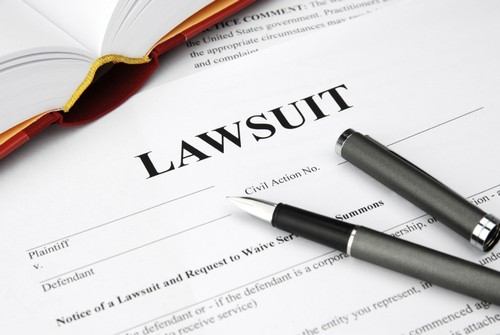
Other Articles of Interest:
- Colorado Criminal Law – Restitution Orders Can Exceed Actual Amount Of The Crime Charged
- Understanding The Crime of Receiving Stolen Property In Colorado
- Colorado Shoplifting Law – How Far Can The Store Go To Make An Arrest?
- Colorado Criminal Law – Understanding The Power Of District Attorneys and Prosecutors To Bring Charges – Pre-Filing Representation
- Obtaining Control Over Any Stolen Thing of Value 18-4-404 and Theft By Receiving Stolen Property




